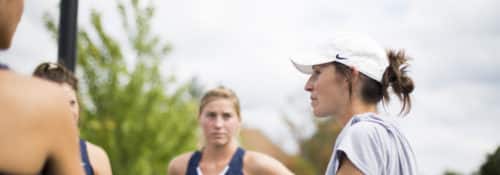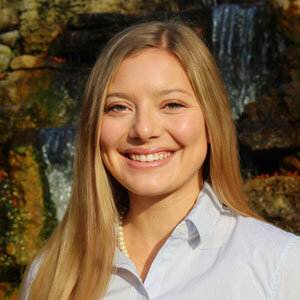
Women’s Health Class Debuts on Campus
Written by Corinne Prost
People tend to take for granted certain wonders that define human existence, such as the way certain cells multiply to create and sustain human life. Among these noteworthy and inestimable blessings are the differences unique to biological gender. The best means of fully appreciating these differences, as with all other subjects, is through education. Nicole Walbright—assistant athletic director and senior women’s administrator, head women’s tennis coach, and instructor in sports studies—has begun offering a one-credit class novel to Hillsdale’s campus. In this debut of the Women’s Health class, 11 other students and I delve into every aspect of female health spanning from infancy to old age, covering topics such as fertility, pregnancy, and diet.
Although the rare few are bright-eyed and bushy-tailed on a Monday night, every student in this class is eager and engaged from the moment we’re seated to the moment class time is up. In fact, our class consistently runs over nearly half an hour with its discussions and students lingering to ask questions.
Walbright was inspired to create this class because of the great interest her female students expressed in learning about their health and nutritional differences as women. She began pitching ideas to her students about a class focused specifically on women’s health and nutrition about three or four years ago, but it wasn’t until last year that she formally proposed the idea to her boss.
“When I was their age, I had to learn a lot about women’s health on my own,” Walbright says. “Coming out of college, I did a lot of personal research. It was eye-opening. I wondered why people didn’t talk about women’s health specifically. I remember thinking as I discovered new information: ‘Wow, it would have been really nice to have a class on all this, or at least have someone around to talk about this more.’ It caused me to think that a class like this for seniors serves as a really great opportunity to equip them with valuable information.”
Walbright hopes that the main takeaway from the course is a realistic idea of what women’s bodies might experience throughout their lives, whether that entails being a mother, wife, or a health-conscious individual.
“Hillsdale students are likely interested in starting a family one day and want to gain knowledge in that area. And they’re interested in nutrition and how it impacts their body. I hope to open up their eyes to how they can be healthy and introduce them to new ideas for their personal health. I want to give them the background information that allows them to choose what’s best to fit their body, and in doing so I want students to ask questions about how they can make use of that knowledge.”
From a student’s perspective, seeing the connections between personal health as a female and living a fulfilled life fits well within Hillsdale’s curriculum.
“I think it starts with how God created our bodies as women. At the very core, our bodies were created for fertility and reproduction. Our health aligns with our general philosophy of supporting and embracing the uniqueness of being a woman.”
The necessity for educating students on the body as well as the mind is why the Physical Wellness Dynamics class was introduced to the core curriculum some years ago. Women’s Health and Nutrition is an extension of the idea that people should have a knowledge base about health.
Walbright explained, “The cool thing about health education is that it’s ever-changing and ever-growing—the quest for knowledge on the subject will never end. Part of my responsibility is to facilitate that continuation of learning about your health and your environment. I want to open the door for wanting to know more.”
While this course is currently a one-credit seminar, Walbright hopes to continue organizing and refining the material to better serve students’ needs.
“It’s been a learning experience to see what this class is interested in,” Walbright says. “I will definitely focus on fertility and reproductive health because that is what links directly to our overall health as women, but I will also cover nutrition and exercise.”
Even for someone who has no educational history in nutrition and health otherwise, this class fits into a diffusive education because it provides the knowledge base necessary to understand what it means to be a healthy woman.
“I’m grateful to have this opportunity that God gave me,” Walbright says. “It’s humbling to be around students and answer their questions. It makes me even happier that they all want to learn, too. This class wouldn’t happen if there wasn’t a desire to learn.”
 Corinne Prost, ’19, is an American studies major and rhetoric minor. She dreams to one day own a library so extensive that it rivals the one from Beauty and the Beast.
Corinne Prost, ’19, is an American studies major and rhetoric minor. She dreams to one day own a library so extensive that it rivals the one from Beauty and the Beast.
Published in September 2019